(完整版)省略to的动词不定式用法归纳
(完整版)省略to的动词不定式用法归纳
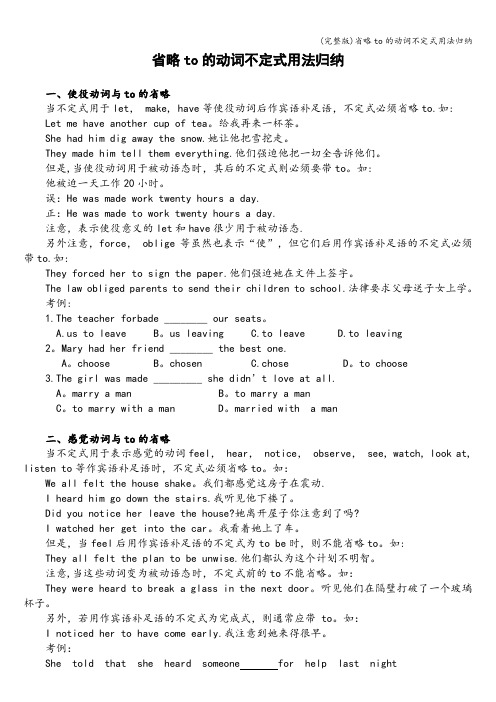
省略to的动词不定式用法归纳一、使役动词与to的省略当不定式用于let, make, have等使役动词后作宾语补足语,不定式必须省略to.如: Let me have another cup of tea。
给我再来一杯茶。
She had him dig away the snow.她让他把雪挖走。
They made him tell them everything.他们强迫他把一切全告诉他们。
但是,当使役动词用于被动语态时,其后的不定式则必须要带to。
如:他被迫一天工作20小时。
误:He was made work twenty hours a day.正:He was made to work twenty hours a day.注意,表示使役意义的let和have很少用于被动语态.另外注意,force, oblige等虽然也表示“使”,但它们后用作宾语补足语的不定式必须带to.如:They forced her to sign the paper.他们强迫她在文件上签字。
The law obliged parents to send their children to school.法律要求父母送子女上学。
考例:1.The teacher forbade ________ our seats。
to leave B。
us leaving C.to leave D.to leaving2。
Mary had her friend ________ the best one.A。
choose B。
chosen C.chose D。
to choose3.The girl was ma de _________ she didn’t love at all.A。
marry a man B。
to marry a manC。
to marry with a man D。
married with a man二、感觉动词与to的省略当不定式用于表示感觉的动词feel, hear, notice, observe, see, watch, look at, listen to等作宾语补足语时,不定式必须省略to。
省略to的不定式的用法

省略to的不定式的用法省略to的不定式是英语语法中的一种常见现象,指的是在一些特定情况下,不定式动词的“to”可以省略。
省略to的不定式用法具有一定的规则和限制,并且在不同的语境和句型中有着不同的表达方式。
本文将以实例来说明省略to的不定式在各种情况下的使用方法。
一、感官动词后的省略to不定式感官动词,如see、hear、watch、feel等,常常可以接省略to的不定式,表示主观感受或者客观情况。
例如:1. I heard her sing a beautiful song. (我听到她唱了一首美丽的歌。
)2. He saw the children play in the park. (他看到孩子们在公园玩耍。
)3. I felt the sun warm my skin. (我感觉到阳光温暖我的皮肤。
)二、助动词后的省略to不定式助动词,如can、could、will、would等,常常可以接省略to的不定式,用于表示能力、许可、命令等。
例如:1. She can swim. (她会游泳。
)2. You should finish your homework before dinner. (你应该在晚饭前完成作业。
)3. They will come to visit us tomorrow. (他们明天会来看我们。
)三、使役动词后的省略to不定式使役动词,如let、make、have等,常常可以接省略to的不定式,表示“让某人做某事”、“使某人做某事”。
例如:1. She let me borrow her book. (她让我借她的书。
)2. My parents made me clean my room. (我的父母让我收拾房间。
)3. He had his car repaired last week. (他上周修理了他的车。
)四、被动结构中的省略to不定式在被动结构中,动词不定式后的to可以省略。
归纳省略to的动词不定式用法

归纳省略to的动词不定式用法归纳省略"to"的动词不定式用法动词不定式是英语中的一个重要语法结构,它由动词原形加上不定式标志"to"构成。
然而,在某些情况下,我们可以省略动词不定式中的"to"。
本文将总结归纳省略"to"的动词不定式用法。
1. 动词感官(verbs of perception)有些动词表示感官知觉,当它们后面接动词不定式时,可以省略"to"。
这些动词包括:- see(看见)- hear(听见)- watch(观看)- feel(感觉)- notice(注意到)- observe(观察)- perceive(察觉)- etc.示例:- I saw him leave the room.(我看见他离开了房间。
)- She heard the birds sing.(她听见了鸟儿的歌声。
)2. 动词让步(verbs of permission)某些动词表示允许、让步,当它们后面接动词不定式时,可以省略"to"。
这些动词包括:- let(允许)- make(使)- have(让)- help(帮助)- watch(观看)- etc.示例:- They let me go to the party.(他们让我去参加派对。
)- She made him clean his room.(她让他打扫了房间。
)3. 动词感觉(verbs of sensation)有些动词表示感觉,当它们后面接动词不定式时,可以省略"to"。
这些动词包括:- feel(感觉)- hear(听到)- listen(听)- watch(看)- smell(闻)- etc.示例:- I heard her sing beautifully.(我听到她唱得很美。
)- He watched the sunset in awe.(他惊叹地看着日落。
探讨省略to的动词不定式的语法规则

探讨省略to的动词不定式的语法规则
动词不定式是英语中的一种常见语法结构,而to是将动词不定式和动作的执行者隔开的符号。
但是,在某些情况下可以省略to,那么何时可以省略,何时不可以省略呢?
可以省略to的情况
1.当动词不定式作为宾语时,to可以省略。
例如:I want (to) watch a movie tonight.(我今晚想看电影。
)
2.介词后面所跟的动词不定式中的to可以省略。
例如:He refused to talk to me. / He refused talking to me.(他拒绝和我谈话。
)
3.特定动词后面的动词不定式中的to可以省略。
例如:let me know / let me to know(让我知道)
不可以省略to的情况
1.当动词不定式作为主语或表语时,to不可省略。
例如:To be or not to be, that is the question.(生存还是毁灭,这是一个问题。
)
2.在被动语态中,to不可省略。
例如:The building is going to be demolished.(这座建筑将要被拆除。
)
3.在复合宾语结构中,to不可省略。
例如:I want you to help me.(我想让你帮我。
)
综上所述,省略to的动词不定式在特定情况下是可以的,但是也需要视情况而定,不能一味地省略。
掌握好省略to的动词不定式的语法规则,可以有效提高英语的表达水平。
初高中英语:省略to的动词不定式

省略“to”的动词不定式初高中英语中,动词不定式做宾语补足语时,有少部分词必须要省略动词不定式符号“to”,这些词主要有:“五看”、“三使”、“两听”、“一感觉”、“一帮助”,具体如下:1.“五看”:①see, ②watch, ③notice, ④observe, ⑤look at①see:看见;见到;看出I saw him play basketball on the playground.我看见他在操场上打篮球。
I often see a girl dance in the next room.我经常看到一个女孩在隔壁房间跳舞。
I saw you put the key in your pocket.我见你把钥匙放进了口袋里。
②watch:看;注视;观看;观察They watched the bus disappear into the distance.他们注视着公共汽车消失在远方。
He seems to enjoy watching me work.他似乎喜欢看我干活。
③notice:看(或听)到;注意到;意识到I noticed them come in.我注意到他们进来了Did you notice volunteers help a man cross the street?你注意到志愿者帮助一个人过马路了吗?④observe:看到;注意到;观察到The police observed a man enter the bank.警察注意到一个男人走进了银行。
⑤look at:看Look at him eat!看他那副吃相!(美国英语)《牛津英语用法指南》(第四版,外语教学与研究出版社2019)p212,Michael Swan (英)编著2.“三使”:①make, ②let, ③have①make促使;使得She always makes me laugh.她总是让我发笑。
This dress makes me look fat.这衣服我穿着显胖。
省略to的动词不定式
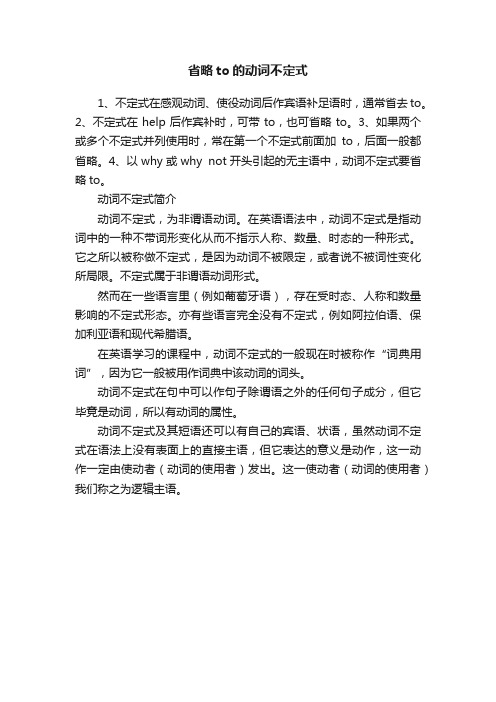
省略to的动词不定式
1、不定式在感观动词、使役动词后作宾语补足语时,通常省去to。
2、不定式在help后作宾补时,可带to,也可省略to。
3、如果两个或多个不定式并列使用时,常在第一个不定式前面加to,后面一般都省略。
4、以why或why not开头引起的无主语中,动词不定式要省略to。
动词不定式简介
动词不定式,为非谓语动词。
在英语语法中,动词不定式是指动词中的一种不带词形变化从而不指示人称、数量、时态的一种形式。
它之所以被称做不定式,是因为动词不被限定,或者说不被词性变化所局限。
不定式属于非谓语动词形式。
然而在一些语言里(例如葡萄牙语),存在受时态、人称和数量影响的不定式形态。
亦有些语言完全没有不定式,例如阿拉伯语、保加利亚语和现代希腊语。
在英语学习的课程中,动词不定式的一般现在时被称作“词典用词”,因为它一般被用作词典中该动词的词头。
动词不定式在句中可以作句子除谓语之外的任何句子成分,但它毕竟是动词,所以有动词的属性。
动词不定式及其短语还可以有自己的宾语、状语,虽然动词不定式在语法上没有表面上的直接主语,但它表达的意义是动作,这一动作一定由使动者(动词的使用者)发出。
这一使动者(动词的使用者)我们称之为逻辑主语。
省略to的不定式了解省略to的不定式的用法

省略to的不定式了解省略to的不定式的用法不定式是英语中的一种非谓语动词形式,它通常由动词原形加上to 构成,例如:to go(去), to eat(吃),to sleep(睡觉)等。
然而,在某些情况下,我们可以忽略不定式前的to,这种形式被称为省略to的不定式。
本文将介绍省略to的不定式的用法以及相关注意事项。
一、省略to的不定式主要用于下列几种情况:1. 动词let当动词let后面接不定式时,to可以省略。
例如:- She let me go to the party.(她让我去参加派对。
)2. 感官动词感官动词如see、watch、hear等后面接宾语和不定式时,to可以省略。
例如:- I heard him sing in the concert.(我听到他在音乐会上唱歌。
)3. 情态动词情态动词如can、may、must等后面接不定式时,to可以省略。
例如:- You must do your homework before playing games.(你必须先做作业再玩游戏。
)4. 动词help当动词help后面接不定式时,to可以省略。
例如:- He helped me carry the heavy boxes.(他帮我搬运沉重的箱子。
)二、需要注意的细节问题:1. 第一个动词是make、let、help、see、hear、watch或feel时,后面的动词不定式可以省略to;2. 在句子中,第一个动词是感官动词或情态动词时,后面的动词不定式可以省略to;3. 省略to的不定式只适用于动词不定式的主动形式,不能用于被动形式;4. 不定式的完整形式“to + 动词原形”通常更正式,所以在正式场合或文学作品中,建议使用完整形式。
三、案例分析:1. They helped me (to) clean the house before the guests arrived.(他们帮我在客人到来之前打扫了房间。
动词不定式省略to的9种情况

不定式省略to的九种情况一、使役动词后省略to的情况在let,make,have等使役动词后用作宾语补足语的不定式必须省略to。
如:Mymotherwouldn’tletmegotothefilm.我妈妈不会让我去看电影的。
Idon’tlikemilk,butmothermademedrinkit.我不喜欢牛奶,可是母亲强迫我喝。
Iwouldhavehimwaitformeatthegateofthepark.我要他在公园门口等我。
注意:1.当使役动词用于被动语态时,要补上在主动语态中省略的to(主要是指make,let和have很少用于被动语态)。
2.force,oblige等虽然也表示2.force,oblige“使”,但它们后用作宾语补足语的不定式必须带to。
如:Heforcedmetogowiththem.他迫使我同他们一起去。
Thepolice obligedhimtoleave.警方强迫他离开。
二、感觉动词后省略to的情况在感觉动词后用作宾语补足语的不定式必须省略to。
如:Iwatchedhergetinto thecar.我看着她上了车。
Isawthewomanenterabank.我看见这个女人进了一家银行。
Weoftenhearhersingthissong.我们经常听到她唱这首歌。
Didyounoticeherleavethehouse?她离开屋子你注意到了吗?注意:1.这里所说的感觉动词主要包括see,hear,observe,notice,feel,watch等。
但是它们用于被动语态时,其后的不定式必须带to。
如:Thewomanwasseen toenterabank.有人看见这个女人进了一家银行。
但是,用于以上句型的动词notice和watch和通常不用于被动语态。
2.类似地,动词lookat和listento 后用作宾语补足语的不定式也不带to。
如:Welistenedtotheoldmantellhissto r y .我们听这位老人讲述3.若动词feel 后用作宾语补足语的不定 式为t o b e ,t o (其他情to)。
省略to的动词不定式

"大家都知道在动词不定式to do中,“to”是不定式的标志,有了这个to,后面所跟的动词该用原形。
但是to也有可以省略的时候,这个时候虽然没有了to,后面所跟的动词依然用原形。
今天的每日一课就给大家总结一些省略to的动词不定式。
1、情态动词(除ought 外)后的to已省略。
例:You must go to the hospital first. 你必须先去医院。
I can swim well. 我能游得很好。
2、使役动词let, have, make后,感官动词see, watch, look at, notice , observe, hear, listen to, smell, feel, find 等词后的to省略。
例:He made the baby crying all night long. 他让那个婴儿哭了一整夜。
Let it be. 就这样吧。
when I passed by, I saw the girl picking the flowers. 我经过的时候,看见那个女孩在摘花。
注意:在这些词的用法中,用于被动语态时不能省去to。
例:I saw him dance. 我看见他跳舞。
=He was seen to dance.The boss made them work the whole night. 老板让他们整夜干活。
=They were made to work the whole night.3、would rather/had better 后的to省略。
例:I would rather go to Japan than the USA.我宁愿去日本也不想去美国。
You had better take a hat with you.你最好带上一顶帽子。
4、why…/why not…句型中not后to省略。
例:why not come to my home for a dinner tonight?今晚何不来我家吃顿饭。
归纳省略to的动词不定式用法
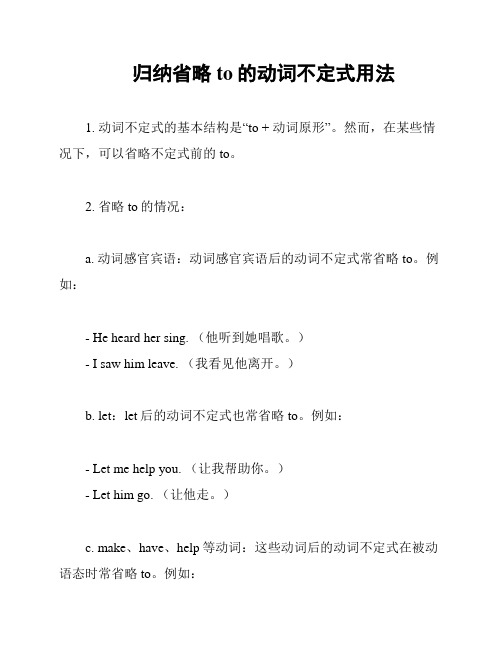
归纳省略to的动词不定式用法1. 动词不定式的基本结构是“to + 动词原形”。
然而,在某些情况下,可以省略不定式前的to。
2. 省略to的情况:a. 动词感官宾语:动词感官宾语后的动词不定式常省略to。
例如:- He heard her sing. (他听到她唱歌。
)- I saw him leave. (我看见他离开。
)b. let:let后的动词不定式也常省略to。
例如:- Let me help you. (让我帮助你。
)- Let him go. (让他走。
)c. make、have、help等动词:这些动词后的动词不定式在被动语态时常省略to。
例如:- She made me clean the room. (她让我打扫房间。
)- I had him fix the car. (我让他修理汽车。
)- He helped her find a job. (他帮她找到了工作。
)d. 情态动词:情态动词后的动词不定式常省略to。
例如:- You should study hard. (你应该努力研究。
)- He can't swim. (他不会游泳。
)3. 注意事项:- 当动词不定式作为名词、形容词或副词的补语时,不省略to。
例如:- My dream is to travel around the world. (我的梦想是周游世界。
)- She is happy to see you. (她高兴地看到了你。
)- He came to help us. (他来了帮助我们。
)- 不定式前如果有形容词或副词修饰,to不能省略。
例如:- She is too tired to dance. (她太累了,无法跳舞。
)- I was too scared to speak. (我害怕得说不出话。
)以上是关于省略to的动词不定式用法的归纳总结。
希望对您有所帮助。
动词不定式省略to的9种情况

动词不定式省略to的9种情况在感觉动词后,不定式作宾语补足语时,通常省略to。
例如:I saw him leave the room.我看到他离开房间。
She heard the ___ ___.她听到孩子们在花园里唱歌。
I felt the ground ___.我感觉到地面在我脚下震动。
注意:感觉动词后的不定式如果有自己的宾语,则不省略to。
例如:I saw him to leave the room.我看到他离开房间。
注意:1.当help之后接一个较长的名词词组作宾语或当其中的不定式所表示的动作主语不直接参加时,不定式通常带to。
例如:Help the little boys at the back of the hall to carry the chairs out.请帮大厅后面那些小男孩把椅子搬出去。
These tablets will help you to sleep.这些药片将对你的睡眠有帮助。
2.在当help用于被动语态时,不定式前的to不能省略。
例如:Help is needed to clean up the mess.需要帮助清理这个混乱。
___ ___.Fourth。
n of "to" after "why (not)。
"___ infinitive after "why (not)。
" cannot be followed by "to"。
For example。
"Why go with him?" and "Why not ask the teacher?" In the sentence "Why not try to expand your story into a novel?"。
it should be "Why not try expanding your story into a novel?"Fifth。
省略to的动词不定式用法归纳

省略to的动词不定式用法归纳一、使役动词与to的省略当不定式用于l et, make, have等使役动词后作宾语补足语,不定式必须省略to。
如:Let me have another cup of tea.给我再来一杯茶。
She had him dig away the snow.她让他把雪挖走。
They made him tell them everyth ing.他们强迫他把一切全告诉他们。
但是,当使役动词用于被动语态时,其后的不定式则必须要带to。
如:他被迫一天工作20小时。
误:He was made work twentyhours a day.正:He was made to work twentyhours a day.注意,表示使役意义的let和ha ve很少用于被动语态。
另外注意,force, oblige等虽然也表示“使”,但它们后用作宾语补足语的不定式必须带t o。
如:They forcedher to sign the paper.他们强迫她在文件上签字。
The law obliged parents to send their childre n to school.法律要求父母送子女上学。
考例:1.The teacher forbade ________ our seats. to leave leavingC.to leaveD.to leaving2.Mary had her friend________ the best one.A.chooseB.chosenC.choseD.to choose3.The girl was made _________shedidn’tloveatall.A.marry a manB.to marry a manC.to marry with a manD.married with a man二、感觉动词与to的省略当不定式用于表示感觉的动词feel, hear, notice,observe, see, watch, look at, listento等作宾语补足语时,不定式必须省略to。
省略to的不定式的用法掌握省略to的不定式的正确用法
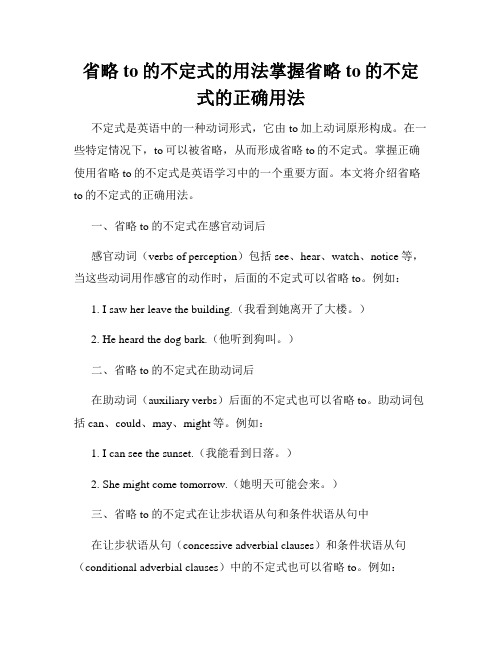
省略to的不定式的用法掌握省略to的不定式的正确用法不定式是英语中的一种动词形式,它由to加上动词原形构成。
在一些特定情况下,to可以被省略,从而形成省略to的不定式。
掌握正确使用省略to的不定式是英语学习中的一个重要方面。
本文将介绍省略to的不定式的正确用法。
一、省略to的不定式在感官动词后感官动词(verbs of perception)包括see、hear、watch、notice等,当这些动词用作感官的动作时,后面的不定式可以省略to。
例如:1. I saw her leave the building.(我看到她离开了大楼。
)2. He heard the dog bark.(他听到狗叫。
)二、省略to的不定式在助动词后在助动词(auxiliary verbs)后面的不定式也可以省略to。
助动词包括can、could、may、might等。
例如:1. I can see the sunset.(我能看到日落。
)2. She might come tomorrow.(她明天可能会来。
)三、省略to的不定式在让步状语从句和条件状语从句中在让步状语从句(concessive adverbial clauses)和条件状语从句(conditional adverbial clauses)中的不定式也可以省略to。
例如:1. Although it's raining, I'll go out.(虽然下雨,但我还是会出去。
)2. If you have any questions, feel free to ask.(如果你有任何问题,随时问我。
)四、省略to的不定式在部分动词后部分动词(verbs of perception、make、let等)后面的不定式也可以省略to。
例如:1. He made me clean the room.(他让我打扫房间。
)2. They let us go early.(他们让我们早点走。
省略to的不定式了解省略to的不定式的使用规则
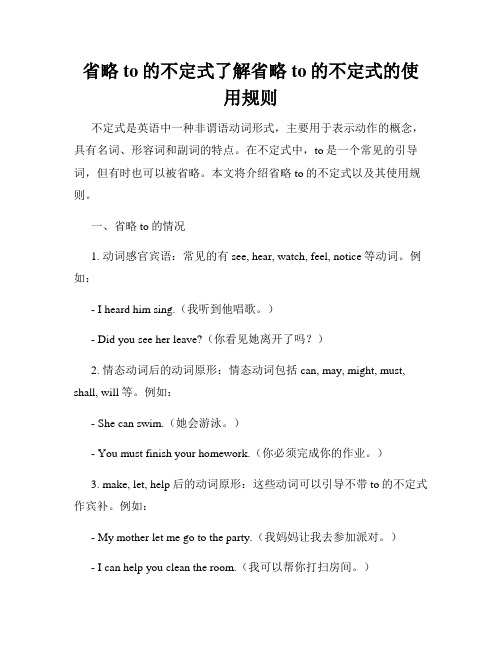
省略to的不定式了解省略to的不定式的使用规则不定式是英语中一种非谓语动词形式,主要用于表示动作的概念,具有名词、形容词和副词的特点。
在不定式中,to是一个常见的引导词,但有时也可以被省略。
本文将介绍省略to的不定式以及其使用规则。
一、省略to的情况1. 动词感官宾语:常见的有see, hear, watch, feel, notice等动词。
例如:- I heard him sing.(我听到他唱歌。
)- Did you see her leave?(你看见她离开了吗?)2. 情态动词后的动词原形:情态动词包括can, may, might, must, shall, will等。
例如:- She can swim.(她会游泳。
)- You must finish your homework.(你必须完成你的作业。
)3. make, let, help后的动词原形:这些动词可以引导不带to的不定式作宾补。
例如:- My mother let me go to the party.(我妈妈让我去参加派对。
)- I can help you clean the room.(我可以帮你打扫房间。
)4. have, let, make, help后的动词过去分词:这些动词也可以引导过去分词作宾补。
例如:- I had my car washed.(我让我的车洗了。
)- He made me laugh.(他让我笑了。
)5. 表示感觉、看法或意见的动词:常见的有feel, hear, let, make, see, notice, watch等。
例如:- I felt the ground shake.(我感觉到地面在震动。
)- Did you see him leave?(你看见他离开了吗?)二、注意事项1. 若省略to,动词后的宾语仍然要保留。
例如:- I let him go.(我让他走。
)2. 省略to后的动词原形仍然带有动作的概念,不能用于现在进行时和完成时态。
省略to的动词不定式
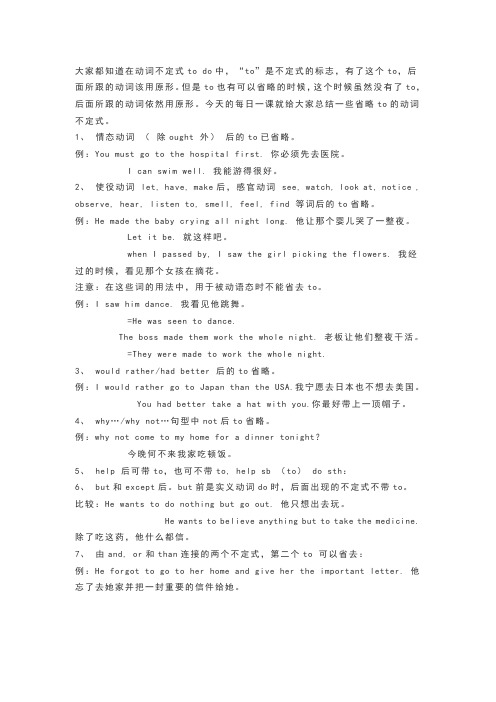
大家都知道在动词不定式to do中,“to”是不定式的标志,有了这个to,后面所跟的动词该用原形。
但是to也有可以省略的时候,这个时候虽然没有了to,后面所跟的动词依然用原形。
今天的每日一课就给大家总结一些省略to的动词不定式。
1、情态动词(除ought 外)后的to已省略。
例:You must go to the hospital first. 你必须先去医院。
I can swim well. 我能游得很好。
2、使役动词let, have, make后,感官动词see, watch, look at, notice , observe, hear, listen to, smell, feel, find 等词后的to省略。
例:He made the baby crying all night long. 他让那个婴儿哭了一整夜。
Let it be. 就这样吧。
when I passed by, I saw the girl picking the flowers. 我经过的时候,看见那个女孩在摘花。
注意:在这些词的用法中,用于被动语态时不能省去to。
例:I saw him dance. 我看见他跳舞。
=He was seen to dance.The boss made them work the whole night. 老板让他们整夜干活。
=They were made to work the whole night.3、would rather/had better 后的to省略。
例:I would rather go to Japan than the USA.我宁愿去日本也不想去美国。
You had better take a hat with you.你最好带上一顶帽子。
4、why…/why not…句型中not后to省略。
例:why not come to my home for a dinner tonight?今晚何不来我家吃顿饭。
省略to的不定式

不定式否定式的几点用法注意
1、不定式的否定式的构成 不定式的否定式通常是将否定词not或never置于不定式之前,即构成not to do 或never to do 这样的形式。 注意not和never一定要放在不定式符号to的前面,而不是其后面。如: He told me not to open the door. 他让我别开门。 Take care not to break the glass. 小心别把玻璃杯打碎了。
I told him not to make a mess in the kitchen. 我叫他不要把厨房弄得乱七八槽。
I promise never to smoke again. 我保证再也不抽烟了。
I’ll let you off if you promise never to do it again. 如果你答应以后再不这样做我可以放过你
二· 、不定式否定式几点值得注意之处 1. 完成式的否定式:如果不定式为完成式,否定词应放在to have之前。如:
She pretended not to have seen him. 她假装没看见他。
You were silly not to have locked your car. 你真笨,竟然没有把汽车锁好。 2. 被动式的否定式:如果不定式为被动式,否定词应放在to be之前。如:
3)在“do nothing but(or.except)..., there be sth.to do but(or except)... , sb.have sth.to do but”等结构中, 介词,but(or except)后用不带to的动词不定形式。 如: He did nothing at the meeting but smoke. 他在会上什么也没干只是吸烟。 I have nothing to do except copy the article for him. 我只好给他抄写这篇文章。
省略to的动词不定式八种情况

省略to的动词不定式⼋种情况⼀、感觉动词后省略to的情况主语+ (四看see/watch/notice/look at,三使役let/make/have,两听listen to/hear, ⼀感觉feel)+宾语+do sth,省略to。
1. 在感觉动词后⽤作宾语补⾜语的不定式必须省略to。
1)这⾥所说的感觉动词主要包括see, hear, observe, notice, feel, watch等。
但是它们⽤于被动语态时,其后的不定式必须带to。
如:The woman was seen to enter a bank. 有⼈看见这个⼥⼈进了⼀家银⾏。
但是,⽤于以上句型的动词notice 和watch和通常不⽤于被动语态。
2) 类似地,动词look at和listen to后⽤作宾语补⾜语的不定式也不带to。
如:We listened to the old man tell his story. 我们听这位⽼⼈讲述他的经历。
3) 若动词feel后⽤作宾语补⾜语的不定式为 to be,则要带to(其他情况不带 to)。
如:They felt the plan to be unwise. 他们认为这个计划不明智。
4) 若不定式为完成式,通常应带 to。
如:Inoticed her to have come early. 我注意到她来得很早。
2.使役动词后省略to的情况在let, make, have等使役动词后⽤作宾语补⾜语的不定式必须省略to。
如:My mother wouldn’t let me go to the film. 我妈妈不会让我去看电影的。
1)当使役动词⽤于被动语态时,要补上在主动语态中省略的to(主要是指make,let和have很少⽤于被动语态)。
2) force, oblige等虽然也表⽰ “使”,但它们后⽤作宾语补⾜语的不定式必须带to。
如:He forced me to go with them.他迫使我同他们⼀起去。
探讨省略to的动词不定式的语法规则
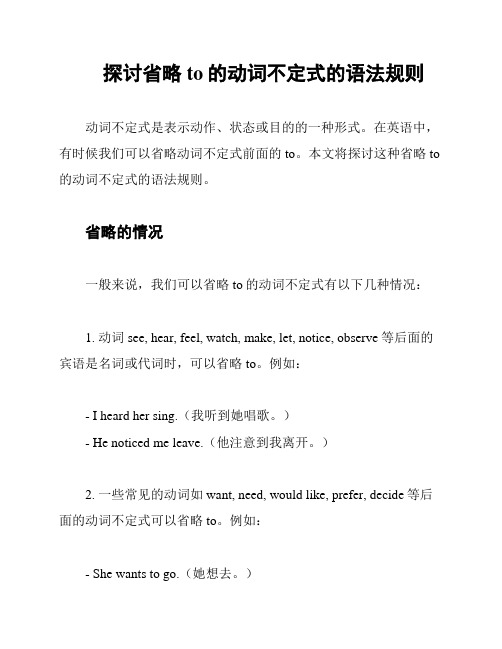
探讨省略to的动词不定式的语法规则动词不定式是表示动作、状态或目的的一种形式。
在英语中,有时候我们可以省略动词不定式前面的to。
本文将探讨这种省略to 的动词不定式的语法规则。
省略的情况一般来说,我们可以省略to的动词不定式有以下几种情况:1. 动词see, hear, feel, watch, make, let, notice, observe等后面的宾语是名词或代词时,可以省略to。
例如:- I heard her sing.(我听到她唱歌。
)- He noticed me leave.(他注意到我离开。
)2. 一些常见的动词如want, need, would like, prefer, decide等后面的动词不定式可以省略to。
例如:- She wants to go.(她想去。
)- I need to finish my homework.(我需要完成作业。
)3. 当两个动词连用时,第二个动词不定式可以省略to。
例如:- He made me cry.(他让我哭。
)- They let us go.(他们让我们走。
)省略to的注意事项在使用省略to的动词不定式时,需要注意以下几点:1. 当省略to的动词不定式作为主语时,动词要用单数形式。
例如:- To swim is my hobby.(游泳是我的爱好。
)2. 如果省略to的动词不定式的主语是第三人称单数,则要使用动词的第三人称单数形式。
例如:- He makes me laugh.(他让我笑。
)3. 如果省略to的动词不定式的主语是复数形式,则要使用动词的原形。
例如:- They make us happy.(他们让我们快乐。
)总结省略to的动词不定式是英语语法中的一种常见现象,但需要根据具体的语境和动词使用情况来决定是否可以省略to。
通过本文的讨论,我们对省略to的动词不定式的语法规则有了更清晰的认识。
希望本文对您有所帮助!。
英语中动词不定式省略to的情况
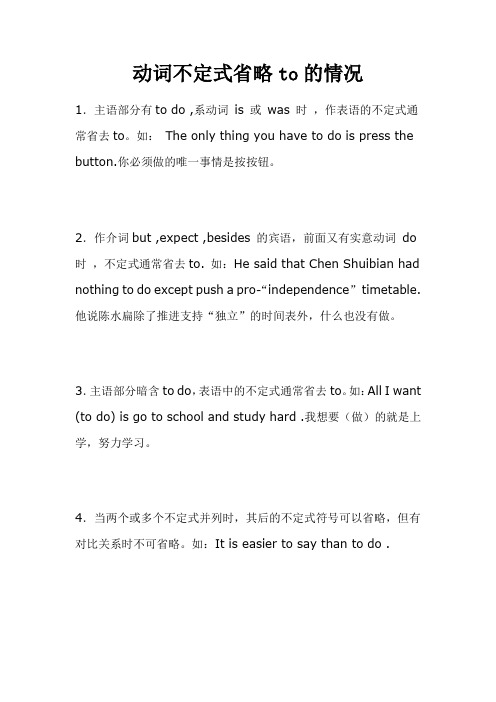
动词不定式省略to的情况1.主语部分有to do ,系动词is 或was 时,作表语的不定式通常省去to。
如:The only thing you have to do is press the button.你必须做的唯一事情是按按钮。
2.作介词but ,expect ,besides 的宾语,前面又有实意动词do 时,不定式通常省去to. 如:He said that Chen Shuibian had nothing to do except push a pro-“independence”timetable.他说陈水扁除了推进支持“独立”的时间表外,什么也没有做。
3.主语部分暗含to do,表语中的不定式通常省去to。
如:All I want (to do) is go to school and study hard .我想要(做)的就是上学,努力学习。
4.当两个或多个不定式并列时,其后的不定式符号可以省略,但有对比关系时不可省略。
如:It is easier to say than to do .5.在would rather…than…等结构中,不定式符号常常要省略. 如:I would rather stay at home than go to see a film.我宁愿呆在家也不愿去看电影。
6.在see ,watch ,notice ,hear, listen to ,look at ,feel ,have, make, let ,observe 等词后作宾语补足语时省略不定式符号to;why (not) do 结构中, 不定式不带to.(1) I saw her enter the room . 我看见她进入了房间(2) Why not join us ?为什么不加入到我们的行列里来呢?。
比较省略to的动词不定式与完整形式的用法差异
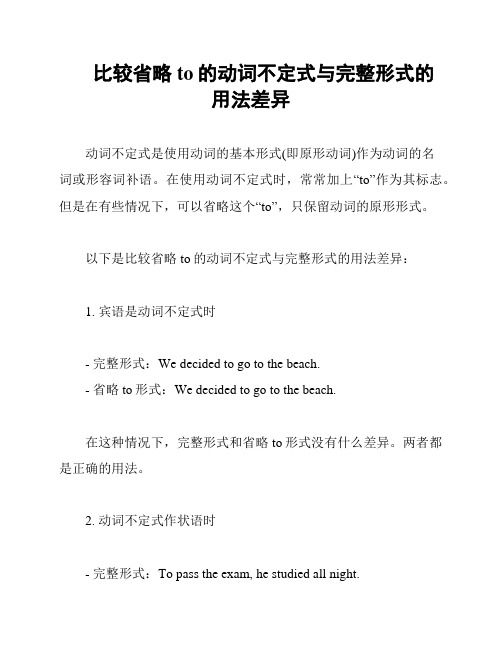
比较省略to的动词不定式与完整形式的用法差异动词不定式是使用动词的基本形式(即原形动词)作为动词的名词或形容词补语。
在使用动词不定式时,常常加上“to”作为其标志。
但是在有些情况下,可以省略这个“to”,只保留动词的原形形式。
以下是比较省略to的动词不定式与完整形式的用法差异:1. 宾语是动词不定式时- 完整形式:We decided to go to the beach.- 省略to形式:We decided to go to the beach.在这种情况下,完整形式和省略to形式没有什么差异。
两者都是正确的用法。
2. 动词不定式作状语时- 完整形式:To pass the exam, he studied all night.- 省略to形式:He studied all night to pass the exam.在这种情况下,完整形式和省略to形式的语序是不同的,但意思是相同的。
3. 特定动词后的动词不定式有些动词后必须使用完整形式的动词不定式,而不是省略to形式的动词不定式。
以下是一些必须使用完整形式的动词:- agree:I agreed to go to the party.- choose:She chose to stay home.- offer:He offered to help me.4. 表示目的动词后的动词不定式在表示目的的动词后,必须使用完整形式的动词不定式。
以下是一些表示目的的动词:- hope:I hope to see you soon.- plan:We plan to visit the museum.- want:She wants to learn Spanish.总的来说,省略to的动词不定式常常用于口语和非正式写作中。
但在某些情况下,必须使用完整形式的动词不定式,这需要根据语境来判断。
- 1、下载文档前请自行甄别文档内容的完整性,平台不提供额外的编辑、内容补充、找答案等附加服务。
- 2、"仅部分预览"的文档,不可在线预览部分如存在完整性等问题,可反馈申请退款(可完整预览的文档不适用该条件!)。
- 3、如文档侵犯您的权益,请联系客服反馈,我们会尽快为您处理(人工客服工作时间:9:00-18:30)。
省略to的动词不定式用法归纳一、使役动词与to的省略当不定式用于let, make, have等使役动词后作宾语补足语,不定式必须省略to。
如:Let me have another cup of tea.给我再来一杯茶。
She had him dig away the snow.她让他把雪挖走。
They made him tell them everything.他们强迫他把一切全告诉他们。
但是,当使役动词用于被动语态时,其后的不定式则必须要带to。
如:他被迫一天工作20小时。
误:He was made work twenty hours a day.正:He was made to work twenty hours a day.注意,表示使役意义的let和have很少用于被动语态。
另外注意,force, oblige等虽然也表示“使”,但它们后用作宾语补足语的不定式必须带to。
如:They forced her to sign the paper.他们强迫她在文件上签字。
The law obliged parents to send their children to school.法律要求父母送子女上学。
考例:1.The teacher forbade ________ our seats. to leave leavingC.to leaveD.to leaving2.Mary had her friend ________ the best one.A.chooseB.chosenC.choseD.to choose3.The girl was ma de _________ she didn’t love at all.A.marry a manB.to marry a manC.to marry with a manD.married with a man二、感觉动词与to的省略当不定式用于表示感觉的动词feel, hear, notice, observe, see, watch, look at, listen to等作宾语补足语时,不定式必须省略to。
如:We all felt the house shake.我们都感觉这房子在震动。
I heard him go down the stairs.我听见他下楼了。
Did you notice her leave the house?她离开屋子你注意到了吗?I watched her get into the car.我看着她上了车。
但是,当feel后用作宾语补足语的不定式为to be时,则不能省略to。
如:They all felt the plan to be unwise.他们都认为这个计划不明智。
注意,当这些动词变为被动语态时,不定式前的to不能省略。
如:They were heard to break a glass in the next door.听见他们在隔壁打破了一个玻璃杯子。
另外,若用作宾语补足语的不定式为完成式,则通常应带to。
如:I noticed her to have come early.我注意到她来得很早。
考例:She told that she heard someone for help last nightA.to callB. callC.calledD.calling三、在had better、would rather、may/might as well、rather than等搭配之后,动词不定式也不带to。
例如:If you'd rather be alone,we'1l a11 leave here.如果你宁愿独自呆着.那我们都离开这儿。
You might as well go without her.你们还是小带她去为好。
(考例)1.You’d better _________ when you come in.A.not to wake up meB.not to wake me upC.not to wake up meD.not to wake me up2.“How about a drink?”“I’d rather ________ something to eat.”A.haveB.to haveC.hadD.having四、在介词but,except之后,如果其前有动词do的某种形式,其后不定式一般不带to,反之则必须带to,表示“不得不,只能”。
例如:He does nothing but watch TV all day long.他整天除了看电视无所事事、I have no choice but to accept the fact.我别无选择只有接受这个事实。
(考例)Sandy could do nothing but____to his teacher that he was wrong.A.admitB.admittedC..admittingD.tO admit五、以why或why not开头引起的无主语中,动词不定式要省略to。
Why argue with him?为什么要和他争辩呢?Why not tell me aboutit in time?为什么不及时告诉我这个问题?(考例)—I usually go there by train.—Why not___by boat for a change?A.to try goingB. trying to goC. to try and goD. try going六、在主语以what、a11、the only thing等开头的包含行为动词do的句子中,作为主语补足语的不定式常可省略to。
The only thing you can do is wait and see,你唯—可做的只有等待和观望了:All l can do is help you finish the work on time.我能做的所有事情就是帮你按时完成工作。
(考例)At present the best thing you should do is___another job,A.1ook for B.1ooks forC.Iooked forD.1ooking for七、为-了避免重复,由and或or连接两个不定式时,—般可以省略第二个不定式符号to。
例如:工’m really puzzled what to think or say我真不知道该怎么想和怎么说。
We want to swim and climb the hills next Saturday我们下个星期六想游泳、爬山。
(考例)The captain decided to send his car there and____at once,A.pick them upB.pick up themC.picked them upD.picked up them注:如果前后两个不定式在意义上有对比关系时,不定式符号to不能省略。
例如:I came not to scold,but to praise you.我来不是批评你,而是表扬你的。
八、一些含有but的固定搭配短语如can’t help but, can’t choose but, can not but, can but等结构中,后面跟不带to的动词不定式。
例如:It rained hard,so they couldn’t choose but stay at home.雨下得很大,他们只得待在家里。
The old lady could but walk slowly with a stick。
那个老太太人只能拄着拐杖慢慢地朝前走。
(考例)1.I cannot but_______your decision.A.admireB.to admireC.admiredD.admires2.Hearing the inspiring news, we couldn’t help but______.A.cheerB.cheeringC.to cheer D.cheered九、在make believe(假装)、make do(将就),let go (放开)、hear say/tell(听人说起)、let fly(发射)、let fall (掉落)、leave go(放开)等固定搭配中,用不带to 的动词不定式。
例如:The man made believe that he was a policeman,那个人装扮成—个警察。
Have you ever heard tell of such things?你有没有听说过这种事情?Don’t let go of the rope.别放开绳子。
十、在动词help之后可用不带to的不定式,也可用带to的不定式。
例如:Will you help me(to)carry the bag?你能帮我拿这个包吗?CustOoers’crit icisms help(to) improve the service work of our shops。
顾客的批评意见帮助我们的商店改进服务工作。
(考例)She can’t hclp_____ the house because she’s busy making a cake,A.cleanB.cleaningC.cleanedD.beinng cleaned特殊例解:1.She can’t help _________ the house because she’s busy making a cake.A. to cleanB. cleaningC. cleanedD. being cleaned2.While shopping, people sometimes can not help _________ into buying something they don’t really need.A. to persuadeB. persuadingC. being persuadedD. be persuaded。
